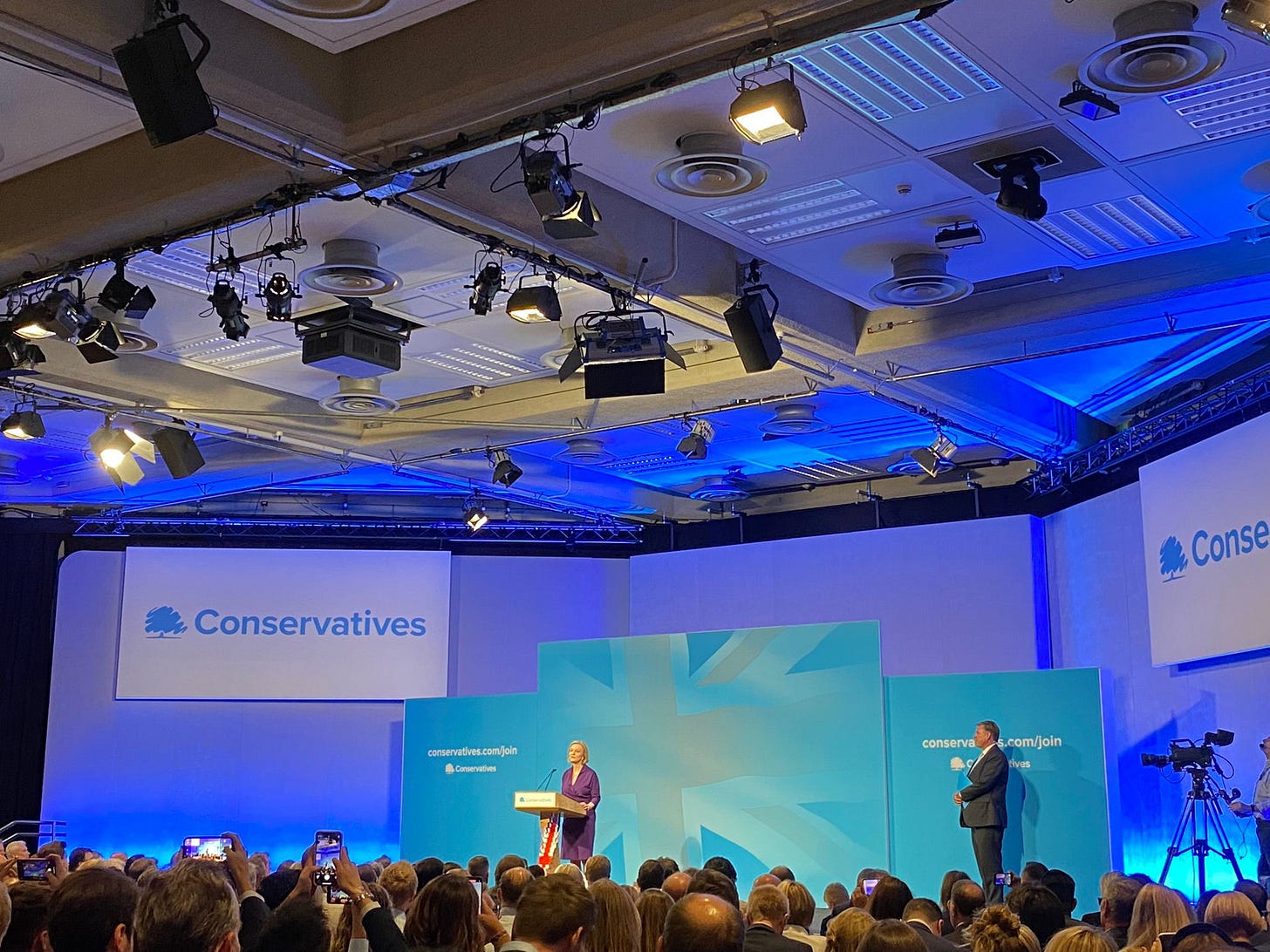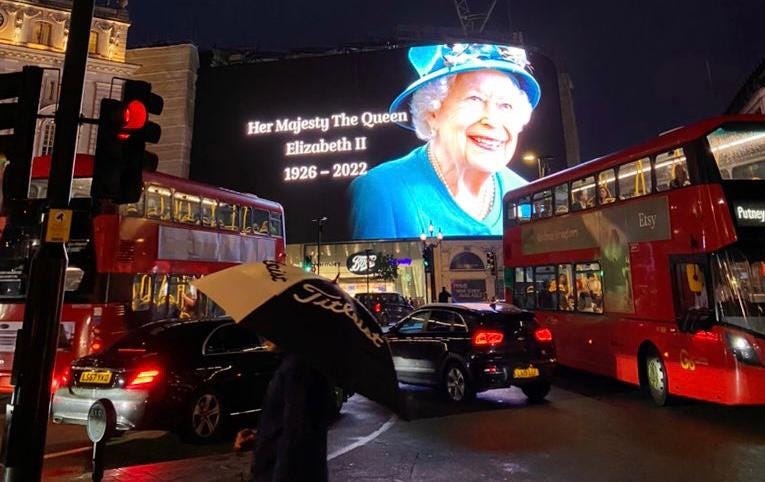Hello. After a not-so-brief hiatus, this correspondence is back to its regularly scheduled programming. I hope you all had a wonderful summer.
In case you missed it: I started a new job at TIME! I’m a staff writer on the foreign affairs beat writing and reporting from the London bureau, so naturally my first few weeks on the job were dominated by all of the major news coming out of Britain: the end of Boris Johnson’s premiership, the beginning of Liz Truss’s, and the death of the world’s longest-reigning monarch, Queen Elizabeth II.
The end of an age. Thank you, Ma’am.
What I’ve written

As Boris Johnson prepared to exit Downing Street for good, I wrote about how his premiership will be remembered and the uncertain legacy he leaves behind:
If it were up to Johnson, perhaps the extent of his legacy would be: a short-lived, but nonetheless consequential, Prime Minister who transformed Britain’s place in the world all the while leading the country through the COVID-19 pandemic and a war in Europe. But as the country reflects on the past three years of Johnson’s leadership, another narrative emerges—one defined by the repeated undermining of the norms and values underpinning Britain’s political culture, perhaps beyond repair. Keep reading here
In anticipation of Liz Truss’s victory this week, I wrote an explainer on everything you need to know about Britain’s new leader:
Truss’s victory over her leadership rival, the former Chancellor Rishi Sunak, had been widely regarded as a foregone conclusion in Westminster. She quickly emerged the runaway favorite among the Conservative Party’s card-carrying members (second only to her erstwhile boss). Despite the U.K.’s soon-to-be third female leader’s efforts to promote herself as the ideological reincarnate of its first, Margaret Thatcher, Truss is perhaps most aptly seen as the continuity Johnson candidate. And perhaps just as well: After she is formally appointed Prime Minister by the Queen on Sept. 6, Truss’s first order of business will be to tackle the many crises that her predecessor left behind. Keep reading here
To mark Truss’s first day in office, I wrote about the policy nightmare(s) she has inherited and what it means for the British Conservative Party’s future in power:
As the former British diplomat Peter Ricketts explains it, Truss has basically been thrown a “hospital pass,” a rugby term that denotes when a teammate has been thrown the ball in a manner that exposes them to a clobbering from the opposing side. “I think that she is being landed in the leadership at a time when the problems are just piling up,” says Ricketts, “and she’s got to face the electorate pretty soon.” Keep reading here
Finally, I spent most of yesterday writing about the news of Queen Elizabeth II’s deteriorating health as well as the meticulous plans in place outlining what should happen in the event of her death. I also contributed reporting to this great piece on how the U.K. is mourning the Queen’s death.
Speaking to people outside Buckingham Palace last night, it was clear that many were mourning not just the loss of their head of state, but a source of stability through so many decades. As one woman put it to me: “So many things come and go. I mean, you’ve seen our politics in the last few years. She was that one constant.”
What I’ve read
This moving long read on the life and legacy of Queen Elizabeth II (The Atlantic)
The death of Queen Elizabeth II today ends the second Elizabethan era. The past 70 years might not feel golden, but they were an age. She steered the monarchy from the world of aristocracy and deference in which she was born, through the social liberation of the swinging 1960s and the bitter divisions of the ’80s and onward into a new millennium; past a Scottish-independence referendum that would have broken apart 300 years of the union; past Brexit, which sundered her kingdom from the European Union; to her final days in a world of smartphones and Instagram. Even as the world changed around her, she remained in place. Like the North Star in the night sky, she was a fixed point, something by which to orient yourself.
This important report on how Facebook’s parent company is failing to stop a Jan. 6-style movement gaining traction on social media in Brazil (TIME)
Content questioning the validity of the upcoming election is spreading rapidly on social media, according to a new report titled “Stop the Steal 2.0” that was shared exclusively with TIME by the non-profit watchdog SumofUs. The spread of this content is contributing to a Jan. 6-style movement gaining traction in Brazil—and Meta, which also owns Brazil’s most widely-used messaging platform WhatsApp, is not doing enough to prevent it, according to SumofUs. The findings echo those of another report published by Global Witness in mid August, which found that Facebook repeatedly approved ads containing falsehoods about the Brazilian election.
This great profile of Congresswoman Alexandria Ocasio-Cortez (GQ)
For a fleeting moment in front of the Supreme Court, it was possible to see the full, complicated public totality of the woman we’ve come to know as “AOC”: a 32-year-old second-term congresswoman representing one of the country’s most diverse districts. A certified celebrity. Arguably more famous than any other person in American politics without the last name Obama or Trump; beloved and loathed at competing ends of the political spectrum. Constitutionally opposed to sitting down, shutting up, and conforming to the patriotic play-theater of Washington. The right wing’s night terror in the flesh. To many foot soldiers of the fractured, contradictory coalition that is the progressive left, she represents something singular: the future. A revolutionary on the rise. The clear heir to an ascendant progressive movement. The best and possibly last—depending on how quickly some combination of fascism, religious fundamentalism, and climate change comes for us all—chance; a source of hope that things can get better in their lifetimes.
What I’m thinking about
My favorite story about the Queen.
Until next time,
Yasmeen







